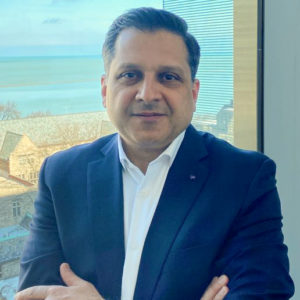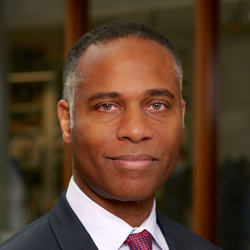Four Feinberg faculty have been elected members of the American Academy of Arts and Sciences, one of the nation’s oldest and most prestigious honorary societies.
Susan Quaggin, MD, Ali Shilatifard, PhD, Shana Kelley, PhD, and Guillermo Ameer, ScD, are among this year’s class of 270 artists, scholars, scientists and leaders in the public, non-profit and private sectors.
The academy was founded in 1780 by John Adams, John Hancock and others who thought that the new republic would require institutions able to gather knowledge and advance learning in service to the public good. The organization is both an honorary society that recognizes excellence in its members and an independent research center convening leaders from across disciplines, professions, and perspectives to address significant challenges.
Advancing Kidney Health

Susan Quaggin, MD, is the chief and Charles Horace Mayo Professor of Nephrology and Hypertension in the Department of Medicine and also director of the Feinberg Cardiovascular and Renal Research Institute.
Quaggin has conducted extensive research related to kidney health. Her work in molecular biology around transcription factor action within developing kidneys has helped improve mouse models used to study kidney disease.
Her research has also spurred new protocols for renal assessments and led to new insights into pre-eclampsia.
Quaggin earned a Doctor of Medicine from the University of Toronto. She completed a fellowship in nephrology at the University of Toronto and completed two post-doctoral fellowships, one in molecular biology of kidney development at the Igarashi Lab at Yale University and another in mouse genetics at the Rossant Lab at the University of Toronto.
She was previously recognized by the American Heart Association in 2012 with the Donald Seldin Lectureship Award and is an elected member of the National Academy of Medicine and the National Academy of Investigators.
“I am truly honored to have been elected to the American Academy of Arts and Sciences, an organization whose mission is focused on advancing the public good,” Quaggin said. “I am so grateful to my colleagues and the many talented trainees and team members I have been privileged to work with over the years who deserve the credit for this recognition.”
Discovering New Directions in Cancer Treatment

Ali Shilatifard, PhD, is the Robert Francis Furchgott Professor and chair of Biochemistry and Molecular Genetics. He is also director of the Simpson Querrey Institute for Epigenetics.
Shilatifard’s research focuses on the causes of childhood leukemia through chromosomal translocations. His laboratory has also discovered novel mechanisms underlying transcription elongation, the process of synthesizing RNA from DNA.
Studies from Shilatifard’s laboratory linking epigenetic factors and transcription elongation control to malignancies have provided new therapeutic approaches for cancer treatment.
Shilatifard moved to the United States in 1984 when he began his study of organic chemistry at Kennesaw State University in Georgia. He completed his PhD at the University of Oklahoma.
He currently serves as the editor for Science Advances. In 2016, he was elected fellow of the American Association for the Advancement of Sciences.
“It is an honor to be elected as a member of this historical and prestigious society and be trusted with the responsibility of its mission to cultivate every art and science which may tend to advance the interest, honor, dignity, and happiness of a free, independent, and virtuous people,” Shilatifard said. “I am also grateful to Northwestern University and Feinberg School of Medicine for providing me with a superb home to conduct my science surrounded by world-class scientists and physicians.”
Pioneering Advances in Bioanalytical Technology

Shana Kelley, PhD, is the Neena B. Schwartz Professor in the Departments of Chemistry, Biomedical Engineering, and Biochemistry and Molecular Genetics. She is also the President of the Chan Zuckerberg Biohub Chicago.
Her research centers on bioanalytical technology development which spans a variety of disciplines. She and her collaborators have pioneered new methods of tracking molecular and cellular analytes with unprecedented sensitivity.
Kelley’s work has been recognized with the ACS Inorganic Nanoscience Award, the ACS Arthur Doolittle Award, the Pittsburgh Conference Achievement Award, the Steacie Prize, an Alfred P. Sloan Research Fellowship, a Camille Dreyfus Teacher-Scholar award, an NSF CAREER Award, a Dreyfus New Faculty Award, and she was also previously named a “Top 100 Innovator” by MIT’s Technology Review.
Kelley is also a Guggenheim Fellow, a fellow of the Royal Society of Canada, the Canadian Academy of Health Sciences, and the American Institute of Biological and Medical Engineering.
She received her PhD from the California Institute of Technology.
A successful inventor and entrepreneur, she holds more than 50 patents worldwide and has founded four molecular diagnostics companies.
“I’m incredibly honored to receive this recognition, which reflects the amazing level of creativity and innovation of the team working with me over the years to create new bioanalytical technologies,” Kelley said.
Furthering Medicine Through Biomaterials, Nanotechnology

Guillermo Ameer is the Daniel Hale Williams Professor of Biomedical Engineering and of Surgery, as well as director of the Center for Advanced Regenerative Engineering.
Ameer’s laboratory develops biomaterials and nanotechnology for regenerative engineering, tissue engineering, medical devices, drug delivery, and cell delivery applications. Ameer and his collaborators pioneered the development of citrate-based antioxidant biomaterials referred to as polydiolcitrates.
He received his bachelor’s degree from the University of Texas at Austin and his doctorate of science in chemical engineering from Massachusetts Institute of Technology.
Ameer has been named an American Association for the Advancement of Science fellow as well as a National Academy of Inventors fellow. He is also an elected member of the National Academy of Medicine.
“It is an honor to have been elected to be part of this very important organization with a long history of excellence and service to our country,” Ameer said. “Specifically, my election recognizes the hard work, intellectual contribution, and dedication that all of my current and former students, postdocs, and team members have put into our research and education program here at Northwestern. This honor also goes to and recognizes the efforts of very important people that were and are a strong influence in my life. I look forward to providing my skills and perspective to the Academy and working with my fellow academy members to continue to improve the quality of life of all people.”






